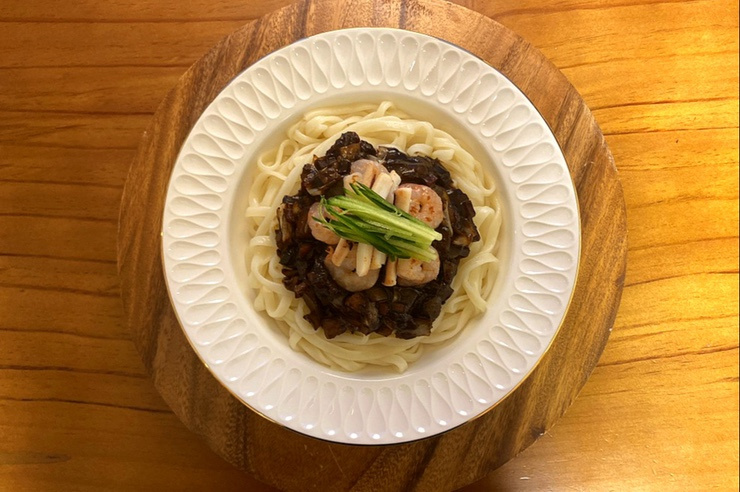Seafood Jjajangmyeon Without Starch: Rich Flavor with Every Bite
Master the Art of ‘Seafood Jjajangmyeon’! Learn How to Fry Black Bean Paste for Unforgettable Flavor.

Discover the secret to incredibly flavorful Seafood Jjajangmyeon made without any added water or starch! This recipe uses the natural sweetness of vegetables and the savory essence of fresh seafood to create a rich, satisfying sauce.
Sauce Ingredients- 8 portions of Kalguksu noodles (thick wheat flour noodles)
- 300g Chunjang (Korean black bean paste)
- 200ml Grapeseed oil (for frying chunjang)
- 1 medium Potato
- 1/2 medium Carrot
- 300g Pork (cubed for curry, or other tender cut)
- 4 medium Onions
- 320g Cabbage
- 1 stalk Green onion
- 2 Tbsp Oyster sauce
- 3 Tbsp Chicken stock
- 1 Tbsp Sugar
Topping Ingredients- 1/2 Cucumber (julienned)
- 400g Mixed seafood (e.g., shrimp, squid, mussels)
Pork Marinade- 2 Tbsp Mirin (or cooking sake)
- 1 tsp Salt
- 1/2 tsp Ginger powder
- Pinch of Black pepper
- 1/2 Cucumber (julienned)
- 400g Mixed seafood (e.g., shrimp, squid, mussels)
Pork Marinade- 2 Tbsp Mirin (or cooking sake)
- 1 tsp Salt
- 1/2 tsp Ginger powder
- Pinch of Black pepper
Cooking Instructions
Step 1
Pour 200ml of grapeseed oil into a wide, deep pan and heat over medium heat.

Step 2
Add 300g of chunjang (Korean black bean paste) to the hot oil.

Step 3
Once the oil starts to bubble, reduce the heat to low and stir continuously for about 10 minutes, ensuring the chunjang doesn’t burn. This frying process deepens the flavor and removes any bitterness.

Step 4
Drain the fried chunjang using a sieve, separating the oil from the paste. Reserve the chunjang oil; it’s full of flavor and will be used later for the sauce.

Step 5
Now, let’s marinate the pork. In a bowl, combine 300g of pork with 2 Tbsp of mirin (or cooking sake) to help tenderize and remove any gamey odors.

Step 6
Add 1 tsp of salt to the pork for seasoning.

Step 7
Add a pinch of black pepper for extra flavor.

Step 8
Finally, mix in 1/2 tsp of ginger powder. Gently massage the marinade into the pork and let it sit for a few minutes.

Step 9
In a separate pan, add about 15 Tbsp of the reserved chunjang oil. If you don’t have enough, you can supplement with a little cooking oil.

Step 10
Add 1 stalk of chopped green onion and stir-fry for about 1 minute until fragrant, creating a flavorful green onion oil.

Step 11
Add the marinated pork to the pan and cook until it turns white on the outside.

Step 12
Add 1 medium potato, peeled and diced.

Step 13
Add 1/2 medium carrot, diced, and cook for about 5 minutes until the vegetables are slightly tender.

Step 14
Add 320g of cabbage, roughly chopped.

Step 15
Add 4 medium onions, roughly chopped, and cook for another 5 minutes until the vegetables soften and become slightly translucent, enhancing their natural sweetness.

Step 16
Stir in 2 Tbsp of oyster sauce for an umami boost.

Step 17
Add 3 Tbsp of chicken stock to enrich the sauce’s depth. Cook for about 5 minutes, allowing the flavors to meld together. (You can also use water or vegetable broth.)

Step 18
Add the fried chunjang back into the pan. Stir well to combine everything evenly, ensuring the chunjang is fully incorporated into the sauce.

Step 19
Finally, stir in 1 Tbsp of sugar to balance the flavors. Your delicious jjajang sauce is now complete!

Step 20
Now, let’s prepare the seafood topping. In a clean pan, add 2 Tbsp of the reserved chunjang oil. Add 400g of mixed seafood. Season lightly with salt and pepper and stir-fry until the seafood is cooked through and flavorful.

Step 21
Meanwhile, bring a pot of water to a boil. Add 8 portions of kalguksu noodles and cook for about 6 minutes. Drain them immediately once cooked.

Step 22
Rinse the cooked noodles thoroughly under cold running water. This ‘cold shower’ helps to firm up the noodles, giving them a wonderfully chewy and springy texture.

Step 23
Assemble your jjajangmyeon by placing the drained noodles in a bowl, generously topping them with the warm jjajang sauce. Arrange the cooked seafood over the sauce, and garnish with the julienned cucumber for a beautiful presentation.

Step 24
Enjoy your homemade Seafood Jjajangmyeon! Because it’s made without starch, you’ll notice a wonderfully clean and deep flavor. Perfect for a delicious family meal!



